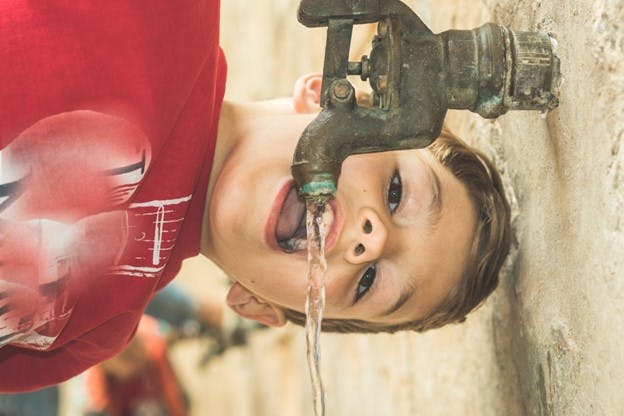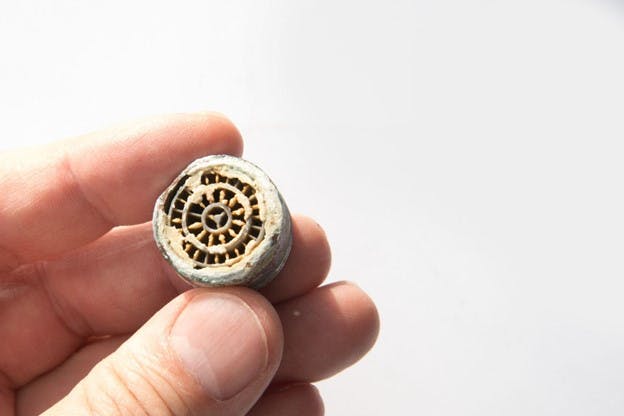May 2023
A Deep Dive into Phoenix Water Quality
There’s no denying the beauty of Phoenix, Arizona. Three hundred days of sunshine and gorgeous desert landscapes are painted with the brush of a thriving cultural scene. With a wide variety of museums featuring everything from Indigenous culture to the world's largest collection of firefighting equipment, and a team in all four major sports leagues, there’s something here for everyone.
The population of 1.7 million people makes Phoenix the fifth largest city in the U.S. and the largest of all state capitals — and it's not done growing. Phoenix has been the fastest-growing large city in the country for much of the last decade despite being located in the Sonoran Desert. This gives the city a unique relationship with water. Population growth puts pressure on a limited water supply — which means maintaining Phoenix water quality is a top priority.
In this article, we’ll explore how these water challenges are met and check out the quality of the water coming from your tap.
Where Does Phoenix Get Its Drinking Water From?
When you turn on the faucet in Phoenix, more than 90% of what comes out is from surface water sources like lakes, rivers, and streams. The remaining water comes from groundwater wells run by the city.
The Salt, Verde, and Colorado Rivers make up the lion’s share, with a bit mixed in from the Agua Fria River. Salt River Project canals deliver the water from the Salt and Verde Rivers, while the Central Arizona Project (CAP) aqueduct delivers water from the Colorado River.
Lake Pleasant stores the CAP water before getting pumped out to five water treatment plants which test, filter, and disinfect it. Once properly treated and made safe for human health, the water travels to thousands of homes and businesses around the city.
The City of Phoenix Water Services Department manages all of this.
Is Phoenix Water Quality Good?
Phoenix has a lot of unique water challenges. Since the 1950s, Phoenix and other desert towns in the southwestern U.S. have experienced unyielding population growth. At the same time, climate change and drought have affected the area’s water supplies.
For instance, just 120 miles from Phoenix, Tucson relies almost entirely on importing water from the now-endangered Colorado River. The groundwater Tucson once used is now too contaminated to drink due to chemical dumping by airfields and military bases.
All things considered, Phoenix has done a great job with water conservation. The city uses the same amount of water today as it did twenty years ago. But that doesn’t mean its problems are solved.
While the city has found alternative water sources and diverted and stored up years’ worth of water from the Colorado River, the stored water has been heavily contaminated. Chromium and arsenic from natural sources, poorly planned landfills, and factory dumping have all impacted the stored water supplies.
It’s not just the water stored for future use that has a pollution problem. Arizona Department of Environmental Quality (ADEQ) listed the water currently in use from the Colorado River as a high risk for contamination. The temporary storage in Lake Pleasant puts the water at risk as the lake has a history of reportable releases or spills which may not have properly resolved.
Is the Water in Phoenix Safe to Drink?
According to standards set by the U.S. Environmental Protection Agency (EPA), tap water in Phoenix is considered safe to drink.
While Phoenix water quality faces many challenges, it has met or exceeded all EPA standards and the standards set by the state of Arizona.
The city of Phoenix undergoes water quality testing millions of times per year at different stages of treatment and delivery to ensure the drinking water quality remains under legal limits on regulated contaminants. However, meeting legal standards doesn’t always equate to safety.
The EPA regulates just 90 water contaminants. This leaves thousands of potential contaminants that the EPA enforceable limit. Many, like microplastics, are undetectable with current technology and can’t be regulated.
The Environmental Working Group (EWG) monitors U.S. drinking water and compares it with the latest scientific research. The EWG points out that many current regulations have yet to keep up with recommendations by the scientific community. There are several instances of this we can see in Phoenix.
What Contaminants Are in Phoenix Water?
It’s expected for water to have some level of contaminants. The ones we’ll look at are within the legal limits but exceed levels deemed safe by the EWG based on current science.
Arsenic
Arsenic is carcinogenic and is known to cause damage to the brain, central nervous system, skin, and blood vessels. Arsenic is a common contaminant in U.S. public drinking water because it can occur naturally in groundwater.
Arsenic levels in Phoenix water have exceeded what the EWG recommends for safety by 1,266 times.
- EPA maximum allowance: 10 ppb
- EWG recommended maximum: 0.004 ppb
- Phoenix maximum detected level: 5.06 ppb
Chromium (Hexavalent)
Chromium is another common contaminant found in U.S. water supplies. It can occur naturally but is also an industrial pollutant. Although it’s known to be a carcinogen, this contaminant is still unregulated by the EPA.
Chromium levels in Phoenix water have exceeded what the EWG recommends for safety by 20 times.
- EPA maximum allowance: No legal limit
- EWG recommended maximum: 0.02 ppb
- Phoenix maximum detected level: 0.408 ppb
Nitrates
Nitrates usually end up in water supplies through stormwater runoff from fertilizers, but they can also come from septic tanks. They can cause oxygen deprivation in infants and increase the risk of certain cancers.
Nitrate levels in Phoenix water have exceeded what the EWG recommends for safety by 16 times.
- EPA maximum allowance: 10 parts per million (ppm)
- EWG recommended maximum: 0.14 ppm
- Phoenix maximum detected level: 2.25 ppm
Haloacetic Acids (HAA5)
HAA5 is made up of five haloacetic acids: monochloroacetic acid, dichloroacetic acid, trichloroacetic acid, monobromoacetic acid, and dibromoacetic acid. These chemicals are known as disinfectant byproducts, resulting from disinfectants like chlorine interacting with organic matter in water. Long-term exposure to HAA5 can lead to cancer.
Levels of HAA5 in Phoenix water have exceeded what the EWG recommends for safety by 121 times.
- EPA maximum allowance: 60 parts per billion (ppb)
- EWG recommended maximum: 0.1 ppb
- Phoenix maximum contaminant level: 12.1 ppb
Haloacetic Acids (HAA9)
HAA9 includes all of the contaminants from HAA5 but adds bromochloroacetic acid, bromodichloroacetic acid, chlorodibromoacetic acid, and tribromoacetic acid. These are also disinfectant byproducts and increase the likelihood of cancer.
Levels of HAA9 in Phoenix water have exceeded what the EWG recommends for safety by 316 times.
- EPA maximum allowance: No legal limit
- EWG recommended maximum: 0.06 ppb
- Phoenix maximum contaminant level: 19 ppb
Total Trihalomethanes (TTHMs)
TTHMs — like the haloacetic acids above — are formed when chlorine interacts with organic compounds in drinking water. They’re also known to be carcinogenic. This category contains four chemicals: chloroform, bromodichloromethane, dibromochloromethane, and bromoform.
Levels of TTHMs in Phoenix water have exceeded what the EWG recommends for safety by 276 times.
- EPA maximum allowance: 80 ppb
- EWG recommended maximum: 0.15 ppb
- Phoenix maximum contaminant level: 41.5 ppb
Radium
Radium is a radioactive heavy metal found in nature and as a byproduct of oil and gas production. Radium is a known carcinogen. Legal limits for radium are measured in picocuries per liter (pCi/L), a measure of radioactivity.
Radium levels in Phoenix water have exceeded what the EWG recommends for safety by 2.2 times.
- EPA maximum allowance: 5 pCi/L
- EWG recommended maximum: 0.05 pCi/L
- Phoenix maximum detected level: 0.11 pCi/L
Does Phoenix Have Hard Water?
With a water hardness of 173–287 parts per million, Phoenix has some of the hardest water in the country. Water is a great solvent. It easily breaks down and carries mineral solids from rocks and soil it passes over. Water hardness is just a measure of the mineral solids like calcium and magnesium found in the water. If there are high concentrations, the water is considered hard. If there are low concentrations, it’s soft water.
While hard water is not considered a health risk for people, the negative health effects it can have on your pipes and appliances that use water can’t be understated. Hard water minerals can:
- Build up on surfaces
- Corrode pipes
- Make appliances work harder
- Make cleaning more difficult
- Damage your clothes
- Give you a bad hair day
If you live in Phoenix, a good water softener or salt-free water conditioner will improve your quality of life.
Why Does the Water in Phoenix Taste Weird?
If you’ve noticed a musty, fishy smell and taste to your water in the late summer and early fall, blame algae blooms. Algae grows in the city water canals at certain times of the year. Though algae is removed from the water during the treatment process, the smell and taste can linger. While this has an aesthetic effect on Phoenix water quality, it’s not known to be a public health risk. Still, if you want to eliminate this unpleasant taste, a good home water filtration system will do the trick.
Does Phoenix Water Have Fluoride?
Yes, Phoenix does fluoridate city water systems to help prevent tooth decay. While most major cities in the U.S. add fluoride to the water, we know some people would rather have control over their fluoride intake. If you want to remove fluoride from your water, make sure you’re using a reverse osmosis system.
Other water filters will not remove fluoride from water.
Can You Get Top Quality Water in Your Phoenix Home?
Phoenix continues to be one of the fastest-growing cities in the U.S. But being a booming city in the middle of a desert has presented many unique water challenges.
If you have concerns about Phoenix water quality or just want drinking water without the aroma of algae, HomeWater can help. We have an assortment of affordable, American-made water filters for any situation.
Protecting your whole house is as simple as installing our HomeWater Whole House 4-Stage Water Filter. Select an add-on water softener to get rid of that extra-hard Arizona water.
Looking for something more local and easy to install? Our HomeWater Under Sink Reverse Osmosis 4-Stage Water Filter easily removes the contaminants Phoenix residents care about, leaving safe drinking water that tastes great in your glass.
You can always find the water filter system to meet your needs at HomeWater.
Related Articles
December 2022


